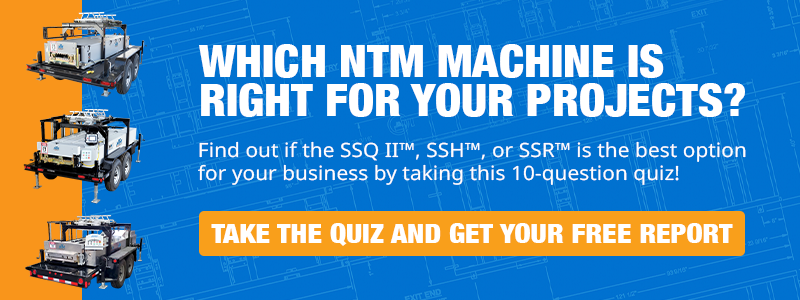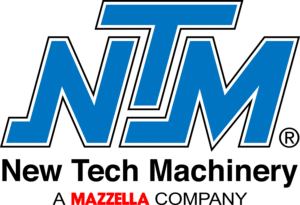Portable Rollforming vs Factory Panel Suppliers: Which Is Better?
Updated for 2025.
Are you weighing your options about whether to buy a portable roof panel machine or to purchase factory panels from a manufacturer or supplier? The right answer may depend on your situation. If you’re doing metal roofing or siding installation, you may be used to having the panels delivered or picking them up.
Prefabricated panels from a manufacturer may work for your operation. Maybe you’ve been doing it this way for years and haven’t really considered other options. That said, it doesn’t hurt to know the differences between portable rollforming and factory supplied panels. While there are negatives and positives to both, portable rollforming may increase your profit margin as it has for many other businesses. Todd Andrews, owner of Classic Metals Inc. in Chester, South Carolina, calls his New Tech Machinery (NTM) SSQ II MultiPro a “printing press for money.”
While there’s no guarantee, if you’re an established metal roofer who doesn’t own a portable rollformer, you may be missing out. Not only will you save money fabricating your own panels, but you can make extra cash doing chop-and-drops for other contractors.
We’ll look at some of the differences between running panels on-site with a portable rollformer and purchasing factory panels from a manufacturer.
In this article, we will discuss:
- The advantages and disadvantages of buying from factory panel suppliers
- The advantages and disadvantages of portable rollforming
- What to look for in your own business to help you decide
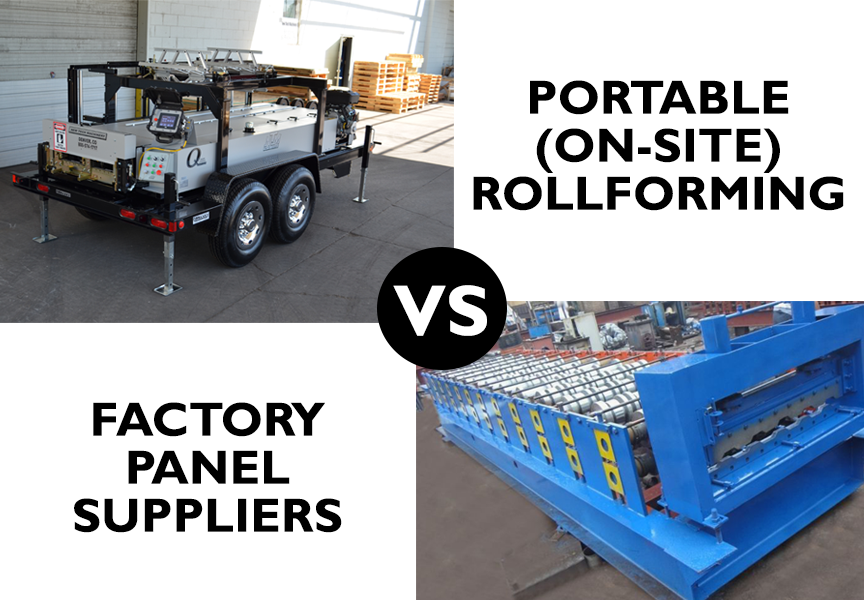
Factory Panel Suppliers
Advantages of Buying From Factory Panel Suppliers
- No Machine Investment – If you don’t own or lease a portable rollforming machine, you’re not paying for it, which is perhaps the most significant advantage to purchasing panels from a factory panel supplier. Some businesses, especially smaller or newer operations, might not have the money to pay for a portable rollforming machine, nor do they want to try to overextend their finances.
- No Machine Operator Required – Going right along with not being able to afford a machine or just not wanting to own one, if you choose to purchase panels from a supplier, you don’t have to worry about dedicating an employee as a machine operator. This saves on money and also devotes existing employees to installation tasks.
- Focus on Installing – Another advantage of buying panels from a supplier is that you don’t have to worry about operating, transporting, and maintaining the machine. Machines require care and storage to protect them from the elements. There are also other investments you might have to make, like purchasing a trailer and accessories. Many of the contractors who don’t own portable rollformers want to focus their business solely on the installation of metal roofing systems, rather than the production of the panels.
- Avoid Maintenance Issues – All machines come with maintenance requirements, especially if it’s frequently running panels. If you don’t own or lease any rollforming machines, performing the required maintenance and adjustments are not your responsibility, as the manufacturer handles these tasks. Again, this is both a time and money saving opportunity.
- Panel Quality – Factory panel suppliers typically utilize longer/larger machines that produce quality finished panels. Bigger machines have space for more forming stations (or more space between forming stations), which allow a more gradual forming process and higher speeds. However, many factory panel suppliers also use portable rollformers (such as NTM machines) inside their factories.
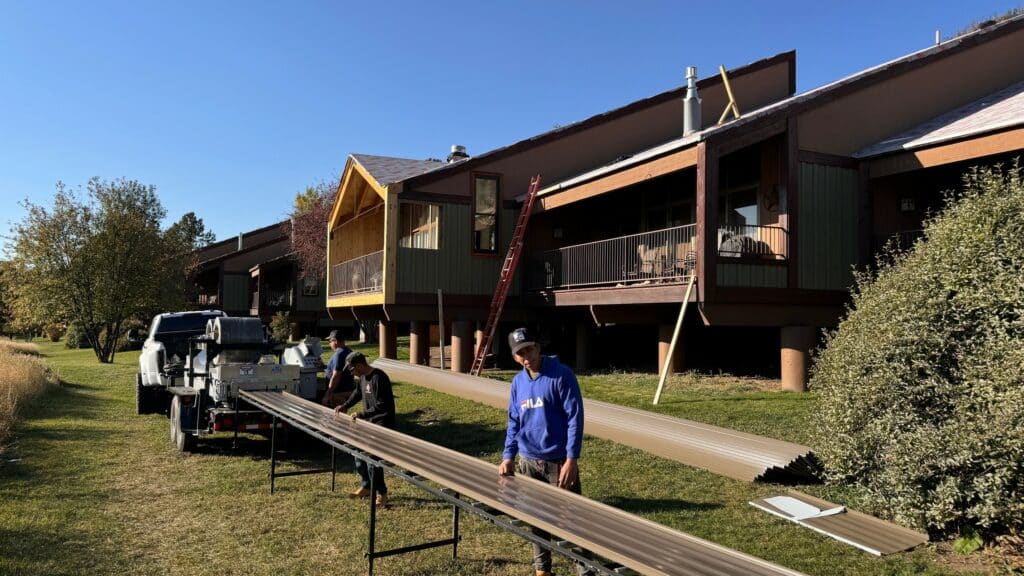
Disadvantages of Buying From Factory Panel Suppliers
- At Mercy of Panel Supplier – When your business purchases panels from a supplier, it’s essential for this manufacturing company to be reputable, reliable, and experienced. If a shipment is missed, the panels are incorrect (profile, color, or size), or the panels arrive damaged, you will have to wait for the supplier to run new replacement panels. If you don’t have panels, you don’t work, which means that while you wait for the delivery, your business is losing out on profits while still paying the supplier for the panels and their markup costs. Plus, you run the risk of losing credibility or reliability with your customers if they hired you and you have to reschedule the installation one or more times.
- Profile Changeover Time – While this is less of a concern for contractors who purchase panels, panel profile changeover time in an in-plant rollformer is still a drawback to mention. With an NTM portable panel machine, changeovers take less than an hour if you have some experience. If you don’t, it will probably take longer, but you don’t want to rush it. The important thing is to get it right, even if it takes a few hours. Once you get it down, you’ll make the changeovers in no time.
- Freight & Shipping Costs – If you’re not picking up the panels at the manufacturer, you will also have to pay shipping and freight costs.
- Shipping Issues – Freight companies are notorious for damaging products before they ever reach their destination. We’ve seen it happen many times with metal roofing panels shipped to a job site, mainly because it’s relatively easy to scratch, scuff, dent, or bend one or more panels during loading and transport. As mentioned before, there is also the possibility of incorrect panels or lengths getting delivered as well. In the end, shipping can be a hassle, a time waster, and a money pit.
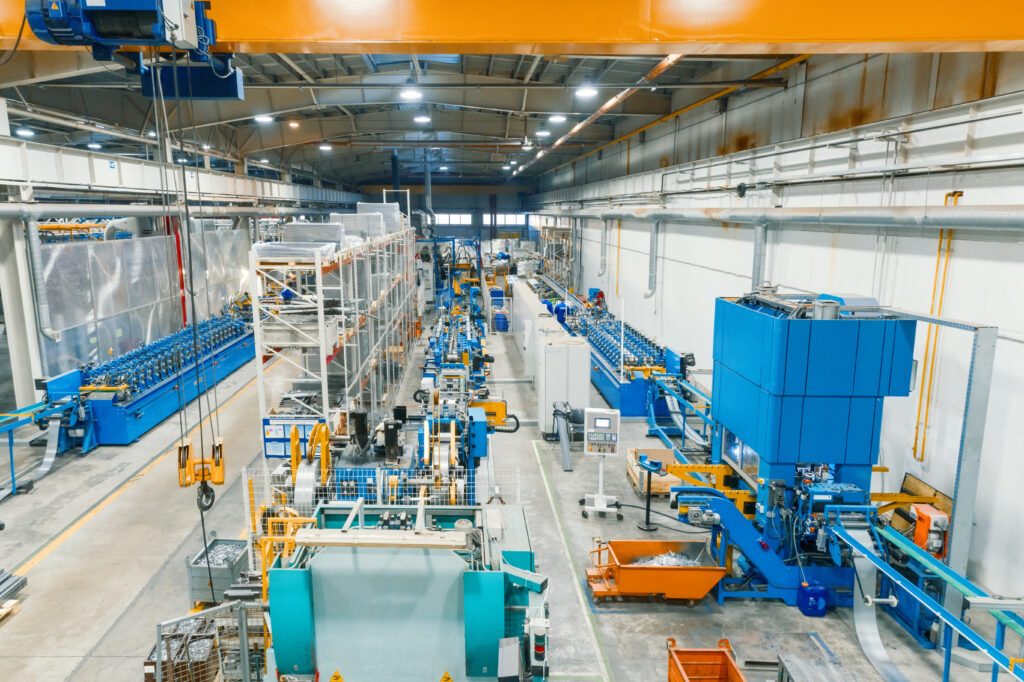
- Length Limitations – Another shipping concern is that there are length limitations for standard shipping containers, as most box trailers or flatbeds are approximately 53 feet long. If you have a project requiring panels that are longer than 53 feet, you’ll have to pay for a specialty truck to deliver your order, which tends to cost more.
- Less “Green” – Shipping trucks emit large amounts of carbon pollutants into the atmosphere, making shipping panels an unideal option if you’re looking to reduce your carbon footprint.
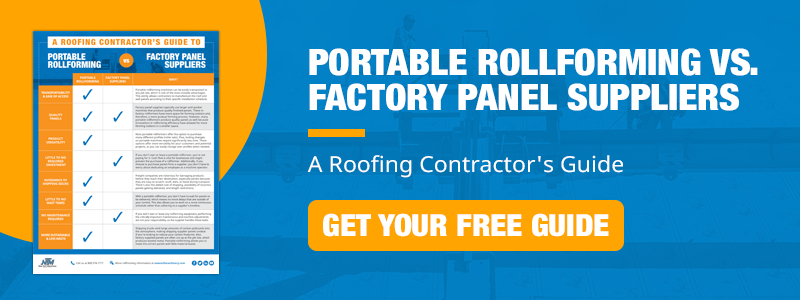
Portable (On-Site) Rollforming
Advantages of Using Portable Rollforming
- Portable – Arguably the most significant benefit is that on-site portable rollforming machines can be taken to any job site with or without a trailer attachment. This ability significantly reduces shipping costs, allows you to control how the panels are made, and brings panel production directly to a job site.
- No Wait Times – When you have a portable rollformer, you no longer have to worry about waiting for a shipment of panels to arrive, which means no more delays that are outside of your control. Not only does this cut out waiting time, but it also allows you to work on a more continuous schedule rather than adhering to the manufacturer or supplier’s timeline. Plus, if there’s a mistake, you won’t have to wait for a reorder to complete a job.
- Diversify Your Business – If your machine is sitting idle, you have the option to run a “chop-and-drop” operation where you can supply panels to others in addition to your business’s installations, which allows you to diversify your business and make extra profits at little cost.
- More Versatile – Many portable rollformers, such as NTM’s line of roof and wall panel machines, offer the option to purchase many different profiles/roller sets. Plus, changeovers (or tooling changes) on portable machines require very little time, around 45 minutes to one hour, while it can take hours on large in-plant machines. These options allow you to provide more versatility to your customers and bid jobs knowing that you can easily exchange profiles.
- Continuous Work – In-plant rollformers produce panels at a faster rate because the machines are larger and have the space for more hydraulics. Portable rollformers operate at a lower speed but still rollform enough panels on-site so the installers can keep installing without stopping and waiting. You can run four coils in a couple of hours–enough to cover a large roof.
- No Shipping Required – As a bonus, you also don’t have to pay for the freight or shipping costs from buying panels if you own a portable machine. Plus, you don’t have to worry about freight damages.
- Less Waste Produced – Let’s say that you don’t own or lease a rollformer and you order panels from a panel supplier. If the wrong panels are delivered or damage occurs during shipping, it’s a waste of both time and materials. In fact, if you lose too much time, it can even lead to fines and/or liquidated damages. Also, factory-delivered panels are often cut up at the job site, which produces even more wasted metal. Additionally, factory panel suppliers tend to overbuy coil to cover themselves, leading to excess or unused coil lying around. With portable rollforming, you’re able to make the correct panels the first time around with little to no wasted metal materials.

Disadvantages of Using Portable Rollforming
- Investment Required – Easily the biggest drawback of portable rollforming is the fact that an investment of some kind (upfront, leased, financed, or otherwise) is required. However, since a rollformer is such a significant investment, many contractors turn to financing companies that specifically work with equipment financing. No matter how the payment is handled: You’ll be paying for the machine in some way.
- Job Stops if Machine Goes Down – If your portable rollformer is having an issue, whether a roller is rubbing up against the metal panel or the machine is out of adjustment, it means the job has stopped. When the job stops for maintenance, the installation ceases for a period, which could result in a profit loss.
- Trained Machine Operator Needed – Training is crucial when operating a rollformer, and it helps to have a trained machine operator on staff, which means there are added overhead costs to cover. Traditionally, there tends to be an above average turnover rate in these types of positions, so that’s another aspect to keep in mind.
- Care and Maintenance Required – Taking care of and performing regular maintenance will 100% make or break a portable rollformer. As a machine owner, it’s your responsibility to properly clean, lubricate, and maintain all of the different parts of your machine. This required maintenance isn’t necessarily a disadvantage, but more of a consideration to keep in mind.
- Width Restrictions – Depending on the profile and the machine type, most portable roofing rollforming machines have a width maximum of approximately 24 inches. While this is less of a problem with architectural standing seam panels, some exposed fastener systems have been known to have panels with larger widths, which might not be possible for many portable rollformers.
How to Know if Factory Panel Suppliers or Portable Rollforming is Best for You
Check Your Budget
One of the easiest ways to know if you should purchase a portable rollformer or buy from a factory panel supplier is to know how much you can and are willing to spend. If you make a reasonable profit, want to take control of your panel production, and feel comfortable putting money down on a machine, you might want to buy a portable rollformer. Alternatively, if you’ve got business limitations or simply don’t have enough to pay for a machine at the moment, stick with purchasing your panels from a supplier. You can always revisit the choice at a later date.
Timing Expectations
One of the first things that you should ask yourself when choosing between portable rollforming vs factory panel suppliers is if you feel comfortable adhering to a manufacturer’s timeline, which will dictate how you schedule installations with your customers. If you find yourself wanting panels to arrive quicker, you can either discuss this with your supplier or look into buying a portable rollformer. If you own a machine, you get to decide when panels are produced, which gives you complete control of your schedule and timeline.
Know Your Company’s Size
Knowing how big your company is and how much you want to grow in the future will help you decide how you get your panels as well. Start by asking yourself these questions:
- Where do I see my business in a year? Two years? Five years?
- How soon do I want to grow my business?
- If you do want to grow quickly, it might not be feasible or cost effective to buy from a supplier and be subject to longer wait times and a lack of control. In this case, we would recommend purchasing or leasing your own portable rollformer.
- Do I have the funds to hire new employees and still maintain my business?
- Do I have a skilled employee who can be trained to operate a portable machine? If not, can I afford to hire this role AND still purchase a portable rollformer?
- If you can’t afford to hire a machine operator or you don’t think someone on your current staff can be trained, you’ll want to stick with purchasing panels from a factory supplier.
Your Company’s Role: Distribution or Manufacturing for Your Installations
If your business wants to go beyond just installing metal roofing to running a “cut and drop” operation either part-time or full-time, you will need to own a portable rollforming machine that you can take to job-sites. However, if you want to focus your business on installation, you can either own a portable roofing machine or purchase the panels from a supplier.
Location
If you’re in a more remote or rural location where there are few choices of panel suppliers in the area, having your own machine might be the most efficient (or only) way to get metal roofing panels for your installation business. Plus, the further you are from the supplier, the more money it will cost to have it shipped. However, that doesn’t mean you shouldn’t have a portable rollformer if you’re in an urban or suburban area either. It just depends on your preference and what you have access to in the region that you serve.
Final Thoughts

So, should you choose factory panel suppliers or portable rollforming? It depends solely on your needs and the needs of your business.
To wrap up, keep these simple thoughts in mind:
- Buying from factory panel suppliers allows you to focus on installation by eliminating maintenance requirements and require no large sum of money to put down at one time. However, you’re often at the mercy of the panel suppliers and their timelines.
- Portable rollformers allow you to control your company’s production, cut out shipping costs, and offer many different profiles. However, you have to pay for the machine servicing and maintenance. Plus, you’ll need to purchase tooling for additional profiles.
After more than 30 years of manufacturing and distributing of high-quality portable metal roofing rollformers, New Tech Machinery knows the importance of choosing the right machine for you. In fact, we’ve supplied businesses all over the world with both types of solutions.
Contact one of our rollforming specialists today to discuss portable rollforming vs factory panel suppliers, how it applies to your business, and what we might recommend as a solution.
